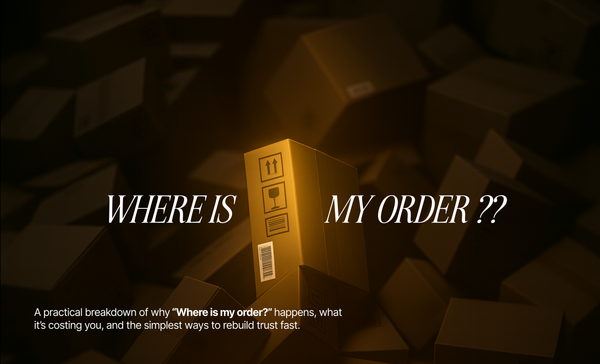3 Ways Ecommerce Automation Impacts Your Business ROI
Conquer eComm with Automation! Drive sales, retain customers & slash costs. Learn the magic of automated workflows & how to win with ROI-boosting strategies.

Running a successful e-commerce business is a constant juggle. You're managing inventory, crafting compelling marketing campaigns, and ensuring a seamless customer experience – all while keeping an eye on the bottom line. In today's competitive landscape, simply keeping up isn't enough. To truly thrive, you need to leverage every available tool to boost efficiency and maximize your return on investment (ROI).
This is where e-commerce automation enters the scene. By taking over repetitive tasks and streamlining workflows, automation frees you and your team to focus on strategic initiatives. But the benefits go far beyond saved time. Automation can significantly improve your ROI through increased sales, enhanced customer retention, and reduced operational costs. This translates to a business that grows, thrives, and leaves the competition in the dust.
Key Takeaways
- Automating for Efficiency
- 3 Ways Ecommerce Automation Impacts Your Business ROI
- Conclusion
Automating for Efficiency: Where Machines Shine (and Where They Don't)
With so many tasks vying for automation, it's crucial to choose wisely. Let's delve into the processes that are ripe for automation and those that are best left in human hands.
Prime Candidates for Automation:
- Repetitive Tasks: Mundane, repetitive tasks like data entry, order processing, and sending follow-up emails are ideal for automation. Kim.cc excels at these functions, freeing your team to focus on higher-level tasks.
- Inventory Management: Automating inventory alerts and reordering processes ensures you always have the products your customers demand. This minimizes stockouts and keeps your business running smoothly.
- Customer Service Inquiries: Kim.cc's AI-powered chatbots can handle basic customer service inquiries 24/7, freeing up your support team for complex issues. Chatbots can also provide product recommendations and answer frequently asked questions, enhancing the overall customer experience.
- Marketing & Sales Campaigns: Personalized marketing emails and product recommendations based on customer behavior can be automated, boosting conversion rates and driving sales.
Processes Best Left to Human Expertise:
- Complex Customer Interactions: While AI chatbots can handle basic inquiries, complex customer issues requiring empathy, critical thinking, and problem-solving skills are best left to human agents.
- Negotiations & Conflict Resolution: Delicate situations involving negotiations or conflict resolution necessitate human interaction and emotional intelligence that automation struggles to replicate.
- Strategic Decision-Making: Strategic decisions concerning business direction, product development, and marketing strategies require human judgment, creativity, and a deep understanding of your target market.
The Key Takeaway: Automation is a powerful tool, but it's not a replacement for human expertise. The sweet spot lies in utilizing automation for repetitive tasks and leveraging human capabilities for complex situations and strategic decision-making. By striking this balance, you can unlock the true potential of automation and propel your e-commerce business to new heights.
3 Ways Ecommerce Automation Impacts Your Business ROI
Investing in automation isn't just about saving time and reducing errors. It can also have a significant impact on your business's return on investment (ROI). Here are three ways automation can improve your ROI:
- Increased Sales: By automating personalized marketing campaigns and product recommendations, you can significantly increase your conversion rates and drive more sales.
- Improved Customer Retention: Automating tasks like sending post-purchase follow-up emails and loyalty programs can help you build stronger customer relationships and encourage repeat business.
- Reduced Operational Costs: By automating tasks and streamlining processes, you can reduce labor costs, improve efficiency, and minimize errors that can lead to wasted time and resources.

People Also Ask
Can you automate an e-commerce business?
Yes, you can automate many aspects of your e-commerce business. This includes tasks related to marketing, sales, inventory management, customer service, and order fulfillment.
What is workflow automation in e-commerce?
Workflow automation refers to the process of using software and tools to automate repetitive tasks within your e-commerce workflow. This can improve efficiency, reduce errors, and free up your team's time to focus on more strategic initiatives.
How do you automate a business workflow?
There are several ways to automate a business workflow. Here are a few steps to consider:
- Identify Repetitive Tasks: Start by analyzing your business processes and identifying repetitive tasks that can be automated. This could include anything from data entry to sending follow-up emails.
- Choose the Right Tools: There are a variety of e-commerce automation tools available. Consider your specific needs and budget when choosing the right tools for your business. Some popular options include Kim.cc (for AI-powered customer experience), Zapier (for connecting different platforms), and Mailchimp (for email marketing automation).
- Set Up Triggers and Actions: Once you've chosen your tools, configure them to automate your chosen tasks. This involves setting up triggers (events that initiate the automation) and actions (what happens when the trigger is activated).
- Test and Monitor: Before launching any automated workflows, thoroughly test them to ensure they function correctly. You should also monitor their performance and make adjustments as needed.
How do I make my business automated?
Making your business automated is an ongoing process. Here are some tips to get you started:
- Start Small: Don't try to automate everything at once. Begin by automating a few key tasks and gradually expand from there.
- Invest in Training: Train your team on how to use the automation tools you implement. This will ensure they understand the process and can troubleshoot any issues that may arise.
- Track Your Results: Monitor the impact of automation on your business metrics, such as sales, customer satisfaction, and operational efficiency. This will help you determine the effectiveness of your automation efforts and identify areas for further improvement.
Conclusion
The e-commerce landscape is dynamic and competitive, demanding constant innovation to stay ahead. By strategically implementing automation, you can streamline tasks, elevate customer experience, and boost your ROI. Remember, automation is a tool to empower your team, not a replacement. As you embrace automation, focus on leveraging human expertise for strategic thinking and complex situations. This winning combination will propel your e-commerce business to new heights!



